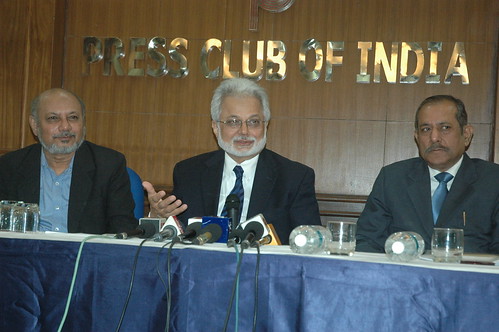By TCN News,
New Delhi: Islamic finance has emerged as a viable alternative world over after the financial meltdown of the West. It is growing at the rate of more than 15%. Not only Muslim countries but modern, secular and industrialized countries like UK, France, Japan, Singapore and Hong Kong have become hub of Islamic finance & banking, said experts on Islamic banking and finance while urging India to open its door for the Islamic finance. They were addressing a press conference organized by Indian Centre for Islamic Finance (ICIF) on 7th Dec. at Press Club of India in New Delhi.
Mr Muddassir Siddiqui, an international expert on Islamic Finance and Shariah head of SNR Denton, Dubai said that “Our country (India) needs US$ 1 trillion to upgrade its infrastructure in order to achieve its target of an annual growth of 9.0% – 9.5, almost double in the 12th Five year plan than the 11th year plan.”

L-R: H Abdur Raqeeb, Mr Muddassir Siddiqui and Mr Khurshid Najmi. Islamic banking experts addressing press in New Delhi on 8th Dec. The press conference was organized by Indian Center For Islamic Finance
Standard & Poor’s report (released on Oct 13, 2011) ‘Will Islamic finance play a key role in funding Asia’s huge infrastructure task?’ mentions that conventional lending markets being jittery the world is now looking towards alternatives to conventional finance and Islamic finance is one such alternative.
In another recent report of Standard & Poor’s entitled ‘Can India’s developing infrastructure keep pace with the Economic Growth?’– its credit analyst Raju Viswanathan talks of India’s inadequate infrastructure to be a major road block to the country’s target of achieving 9.0 – 9.5% annual growth in 2012-2017. The country’s twelfth five-year plan for the period 2012-2017, targets on removing some of these roadblocks and creating a framework for private-sector participation, but it depends on the ability of India’s leaders to execute these plans, it added.
Mr Siddiqui also talked of the Prospects of Islamic Finance and said that “an estimated $1.5-trillion funds sloshing around the Middle East, largely from higher oil prices which is going to increase by about 7 Trillion by 2020. Our country is emerging as a global economic power. As per the Planning Commission report, there is a huge gap of US 300 billion (30% funding Gap) to meet the financial requirement of infrastructure sector up to 2017. Islamic financial products are ideally suitable for the much needed funding for the long term investment in various sectors including infrastructure sector. These tools – called Sukuk, are in use, by both the developing countries like Indonesia & Malaysia and developed countries like U.K., France and Germany. India should also make use of the resources awaiting investment”.
Introducing the theme of the press conference H Abdur Raqeeb, General Secretary, Indian Centre for Islamic Finance (ICIF) New Delhi and Convener, National Committee on Islamic Banking said “Even after forty years of nationalization of the banks, 60% of the people do not have access to formal banking services and only 5.2% of the villages have bank branches. Marginal farmers, petty traders, land less labors, self employed and unorganized sector enterprise, ethnic minority and women – Aam Aadmi of the country continue to form “the financially excluded class”.
According to Sachar Committee Report, banking sector has categorized Muslims and Muslim dominated areas as “Negative Zone”. This exclusion is partly due to reasons of their faith, interest being not permitted.
To a question whether Islamic Finance is for Muslims only, Mr Raqeeb said that Islamic Finance is for all people and cited that “In countries where Islamic finance has been allowed, it has attracted both Muslims and members of other faiths because it is seen as encouraging ethical and socially responsible investments. In Malaysia, for instance, more than 40% investors and 60% borrowers are non-Muslims and in Britain the figure is about 20%.”
Answering questions from journalists, Mr Khurshid Najmi, former joint advisor, RBI and presently Partner, India Law Services said that High level Committee on Financial Sector Reform-CFSR of the Planning Commission of India (2008) headed by Dr Raghuram Rajan has recommended interest free finance & banking to be introduced in the main banking sector for growth with inclusion and innovation.
He also informed the journalists that ‘Kerala Government has announced to tap unutilized funds from NRIs to open up Islamic Finance for huge Infrastructure development as well as allowing an NBFC Al-Barakah to function on Shariah principles. Recent High Court Judgement of Kerala has also cleared the way. Andhra Pradesh Government has announced that it is launching interest free loans to help SHGs and Microfinance Institutions.’

